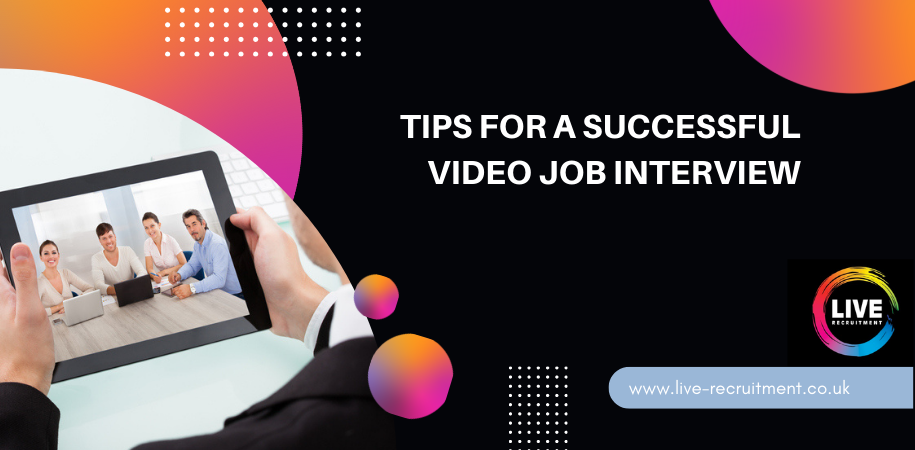In today's digital world, more and more companies are opting to conduct job interviews via video. There are so many benefits to conducting video interviews, including:
When hiring from overseas, video interviews help to save the company time and money since they don't have to fly candidates in for an interview.
It allows the company to assess a candidate's body language and communication skills. There is so much involved with non-verbal communication, and some people find it difficult to “read” a person from a phone interview.
And it gives the candidate a chance to "show off" their personality in a way that a phone interview might not.
While it might be easier for the employer, it can be very stressful for the interview candidate. The added pressure of technical difficulties can be a lot to navigate when you are also trying to make a good impression. But, fear not, there are simple things you can do to help make your video interview less stressful.
If you're a job seeker who has been asked to participate in a video job interview, there are some things you can do to prepare and increase your chances of success. Here are seven tips to help get you started.
1. Do your research
Before the interview, take some time to research the company and the position you're applying for. This will help you be prepared to answer questions about why you want the job, and what you know about the company. Additionally, knowing more about the company will help you ask smart questions during the interview.
Since they won’t be able to see what you see, it’s possible to include notes around your monitor, provided you don’t find them distracting. If you struggle with numbers or dates, this can be a great way to help you to focus.
2. Make sure you have a good internet connection
A bad internet connection can ruin a video call. Before your interview, test your internet connection to make sure there are no issues. If you're using a laptop, make sure it's plugged in, so you don't have to worry about the battery dying during the call.
If you’re using a phone, make sure it is reliable and connected to WiFi rather than your phone data plan. Most modern phones will switch between the two if one is unreliable.
3. Dress the part
Even though the interviewer won't be able to see your whole outfit, it's important to dress professionally from the waist up. Wear clothing that is appropriate for the job you're applying for, and avoid anything too casual or revealing.
It's usually best to get ready for an interview in the same way you would if you were going to meet them in person, rather than wearing PJ bottoms with your shirt and tie. Getting dressed can put you in the right frame of mind for an interview and will also save you the embarrassment if you need to stand up for any reason throughout the interview.
4. Pay attention to your body language
Your body language says a lot about you, even on a video call. Sit up straight, make eye contact with the camera (not the screen), and smile when appropriate. Avoid fidgeting or playing with something out of the view of the camera. Nod your head when the interviewer is speaking, and give them time to finish their question before you start answering.
Since there might be a delay on the call, always wait a moment before you start answering, or you might find that you are always talking over one another.
5. Prepare for technical difficulties
Even if you've tested your internet connection and everything seems to be working fine, there's always a chance something could go wrong during the call. If your audio or video cuts out, don't panic. Just try to troubleshoot the problem as best you can.
For example, if your audio is cutting out, try plugging in headphones or moving to a different location. If all else fails, be prepared to continue the interview via phone. Employers know that technical problems can happen, and it isn’t your fault, so don’t allow this to get you flustered. They might even be willing to reschedule the interview to give you time to fix your technical problems.
6. Think about the background and lighting
Turn your camera on and sit in the frame. What can you see behind you? You should aim to remove clutter and anything potentially embarrassing from the frame before your call. If you try to move things during the call, you’ll only draw attention to yourself. If you are conducting the call from your bedroom, for example, and don’t want to share your background, choose the setting that allows you to blur the background.
The lighting looks best when it’s natural and not direct. You don’t want to be under any harsh lights that will cast shadows on your face. Likewise, you don’t want a bright light behind you, as it will wash your face and make it difficult for the interviewer to see you. Try moving the camera around to find the right angle, and be wary of how the sun might move throughout the day.
7. Make sure you have privacy
There is nothing more stressful in an interview than being disturbed by your partner, kids, housemates, delivery drivers or anyone else. Schedule the call for a time when you know you can be alone. Ideally, you should be in a separate room with a closing door. Hang a note on the door to remind forgetful people that they should steer clear until you’re done with your call.
Closing thoughts
By following these tips, you'll be better prepared for your video job interview and will have a greater chance of impressing the interviewer and landing the job. Don’t overthink the video interview; it’s still just an opportunity to talk about your skills and experience and to learn more about the role. Relax and rely on your preparation to help you through it.


